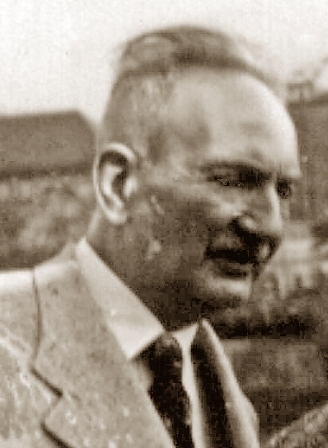Search for Names, Places and Biographies
Already layed Stumbling Stones
Suche
Franz Oppens * 1876
Lübeckertordamm 4 (Finanzgericht) (Hamburg-Mitte, St. Georg)
DR. FRANZ OPPENS
REICHSFINANZRAT
JG. 1876
VERHAFTET 1944
DEPORTIERT 1944
AUSCHWITZ
ERMORDET
Dr. Franz Oppens, born 7 Mar. 1876 in Hamburg, deported 28 July 1944 to Auschwitz
Franz Oppens was the third of four children of the merchant Julius Oppenheim and his wife Emilie, née Wolfers. His father left Echte, his place of birth, in the foothills of the Harz Mountains at the age of 20 and went to Hamburg. As of 1855 he sold English men’s clothing as an independent businessman. In 1862 he founded the textiles company Oppenheim & Rappolt together with Joseph Rappolt which became a leading German manufacturer of high quality menswear. One year later he married Emilie Wolfers who came from a long-established, wealthy family in Minden. The couple had four sons: Richard (born in 1866), who became a merchant like his father, Georg (born in 1871), who obtained his engineering qualification, Franz (born in 1876) and Paul (born in 1883), who became a notary. All four children left the Jewish Community in 1891, were baptized as Protestants or, like Richard, remained undenominational. In 1911 Richard, Franz and Paul changed their last name to Oppens with permission of the Hamburg Senate; Georg did the same in 1920.
Franz Oppens graduated high school at the Johanneum Gelehrtenschule in Feb. 1894. Afterwards he studied law at the universities in Munich, Leipzig and Kiel. He passed the first law exam in Kiel on 11 Dec. 1897. During his legal traineeship, he obtained his doctorate in law from Jena University on 28 Feb. 1899. He took the second law exam in Hamburg on 16 Dec. 1901. He joined the Hamburg fiscal authority as an assessor and was appointed as a senior civil servant in 1905 at the deputation for indirect taxation and levies.
In 1909 he wedded Elisabeth Friedrichs. She was the daughter of the Potsdam manufacturer and imperial councillor of commerce Heinrich Friedrichs and his wife Lina née Kaufmann and – like her husband – was baptized in the Protestant Church at an early age. The couple had two children: Kurt (born in 1910) and Gisela (born in 1912). The family lived at the Elbchaussee across from Hirschpark as of 1919. Elisabeth Oppens died in 1922 at the age of 32.
Franz Oppens was transferred to the Reichs Service in 1919 as a result of the altered financial and tax system based on the Weimar Constitution. As a regional senior civil servant, he initially became head of the St. Georg Tax Office. In 1925 he became chairman of the tax court at the Unterelbe state financial authority, his official title being Financial Authority Director. On 7 Jan. 1933 he was appointed Reich Financial Councillor at the Reich Tax Court in Munich where he was assigned to the 2nd Senate, which was responsible for transport tax. After the so-called Law for the Restoration of the Professional Civil Service from 7 Apr. 1933 came into effect, he was able to stay in the civil service because an exception was made to the "Aryanian paragraphs” providing for "old civil servants”. However, like all civil servants who the National Socialists regarded as "full Jews”, he was forced into retirement as of 31 Dec. 1935 due to the Reich Law on Citizenship.
On 1 Jan. 1937, Franz Oppens and his second wife returned to Hamburg where they moved into an apartment at Lohmühlenstraße. He had married her in 1931 after his children had finished their school education. By order of the Hamburg Police President from 7 Nov. 1938, he had to use the first name of Dan instead of the names Franz Johann. In late Oct. 1941 he announced his plans to immigrate in the near future to the United States via Portugal to Hamburg’s regional finance president who was responsible for his pension rights. His son Kurt was already living in the US. He was never able to fulfill his plan because by that time the Reich Main Security Office (Reichssicherheitshauptamt) had already banned Jews from leaving the country for the duration of the war. On 20 Apr. 1942, Franz Oppens, as the "Jewish partner of a nonprivileged mixed marriage”, left the apartment he shared with his wife and moved into the "Jewish house” at Rappstraße 15 at the behest of the Gestapo. After that date he spent his days with his wife in their apartment on Lohmühlenstraße and nights on Rappstraße until their apartment on Lohmühlenstraße was bombed out in 1943 and his wife moved in with her son in southern Germany. On 9 May 1944 Franz Oppens was arrested by the Gestapo for reasons which can no longer be established. Although the Gestapo informed the regional finance president, upon request, that "his evactuation was not planned”, he was deported to Auschwitz on 28 July 1944, from where he never returned.
Translator: Suzanne von Engelhardt
Kindly supported by the Hermann Reemtsma Stiftung, Hamburg.
Stand: January 2018
© Heiko Morisse
Quellen: Staatsarchiv Hamburg, 131-15 Senatskanzlei-Personalakten, C 338; Staatsarchiv Hamburg, 351-11 Amt für Wiedergutmachung, 7838; Staatsarchiv Hamburg, 314-15 Oberfinanzpräsident-Devisen- und Vermögensverwertungsstelle, R 1941/138 und FVg 8865; Bundesarchiv Berlin, R 2/102981-102985


